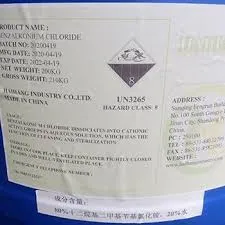cooling tower scale inhibitor
Cooling Tower Scale Inhibitors Enhancing Efficiency and Longevity
Cooling towers are essential components in various industrial processes, particularly in power generation, chemical manufacturing, and HVAC systems. They help dissipate heat from machinery and maintain optimal operational temperatures. However, the continuous circulation of water can lead to the formation of scale deposits, which can significantly impact performance and efficiency. To mitigate this issue, cooling tower scale inhibitors are employed to prevent scale formation and ensure the smooth operation of these systems.
Understanding Scale Formation
Scale primarily forms due to the precipitation of dissolved minerals, most commonly calcium and magnesium salts, as water evaporates in the cooling process. The concentration of these minerals increases over time, leading to the formation of hard deposits on the cooling tower components, including the heat exchangers, fill media, and piping. Scale buildup can reduce thermal efficiency, restrict water flow, and ultimately require costly maintenance and repairs. Thus, addressing scale formation is crucial for improving operational efficiency and extending the lifespan of cooling tower systems.
The Role of Scale Inhibitors
Cooling tower scale inhibitors serve as critical agents in preventing the crystallization of scale-forming minerals. They work by interrupting the formation of crystalline structures, keeping minerals in a soluble form, and thereby preventing their deposition on surfaces. These inhibitors can be categorized into several types, including phosphonates, polyacrylates, and organic polymer-based inhibitors.
1. Phosphonates These are highly effective scale inhibitors due to their ability to sequester calcium and magnesium ions. They prevent the precipitation of scale and can effectively break down existing deposits. Phosphonates are often used in combination with other chemicals to enhance their effectiveness.
2. Polyacrylates These organic compounds act by dispersing scale particles, preventing them from clumping together and forming larger deposits. Their versatility and compatibility with various systems make them a popular choice for many cooling tower applications.
3. Organic Polymer-Based Inhibitors These inhibitors are designed to stabilize particles in suspension, preventing scale formation without the use of phosphorous compounds. They are particularly advantageous in systems where environmental regulations restrict the use of phosphonates and other phosphorus-containing chemicals.
The Benefits of Using Scale Inhibitors
The use of scale inhibitors in cooling towers presents numerous benefits
cooling tower scale inhibitor

- Improved Heat Exchange Efficiency By mitigating scale formation, inhibitors help maintain optimal heat transfer efficiency, which leads to reduced energy consumption and lower operational costs.
- Extended Equipment Life Scale buildup can lead to corrosion and damage to cooling tower components
. Using inhibitors can extend the life of the equipment and reduce the frequency of repairs or replacements.- Lower Maintenance Costs Regular maintenance to remove scale deposits can be labor-intensive and costly. By preventing scale formation, cooling tower operators can minimize maintenance interventions, saving time and resources.
- Environmental Compliance With stricter regulations regarding chemical usage in industrial processes, many cooling tower operators are seeking environmentally friendly alternatives. Scale inhibitors that do not contain harmful phosphorous compounds can help meet these regulatory requirements.
Implementation Considerations
While selecting scale inhibitors, several factors should be taken into account
- Water Quality The mineral content and characteristics of feedwater can influence the effectiveness of specific inhibitors. A thorough analysis of water quality is essential for selecting the most suitable scale inhibitor.
- System Type Different cooling tower technologies may respond differently to various inhibitors. Understanding the specific application can help in choosing the right product.
- Dosage and Monitoring Proper dosing is crucial for the effectiveness of scale inhibitors. Operators should implement monitoring systems to ensure that the inhibitors are present in the correct concentrations.
Conclusion
Cooling tower scale inhibitors are invaluable tools for maintaining efficiency and longevity in cooling tower systems. By preventing scale formation, they help ensure optimal heat transfer, reduce maintenance costs, and extend equipment lifespan. As industries continue to seek sustainable and efficient solutions, the role of scale inhibitors will undoubtedly become increasingly significant. With the right selection and application of these inhibitors, cooling tower operators can achieve enhanced performance and lower environmental impact, leading to a more sustainable industrial future.
-
Water Treatment with Flocculant Water TreatmentNewsJun.12,2025
-
Polymaleic AnhydrideNewsJun.12,2025
-
Polyaspartic AcidNewsJun.12,2025
-
Enhance Industrial Processes with IsothiazolinonesNewsJun.12,2025
-
Enhance Industrial Processes with PBTCA SolutionsNewsJun.12,2025
-
Dodecyldimethylbenzylammonium Chloride SolutionsNewsJun.12,2025





